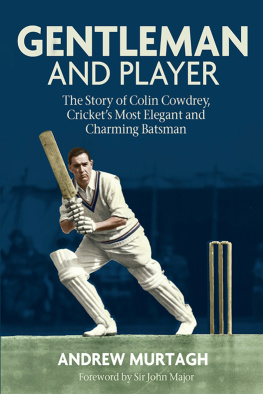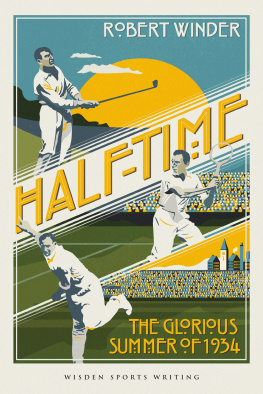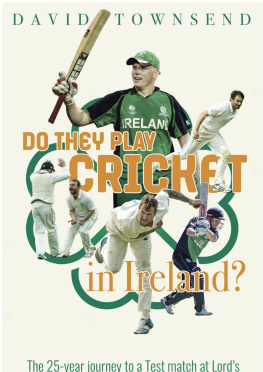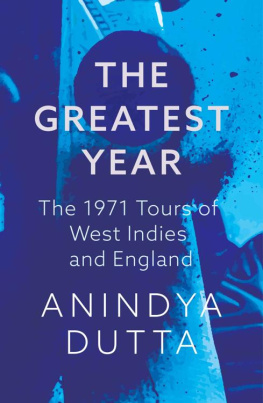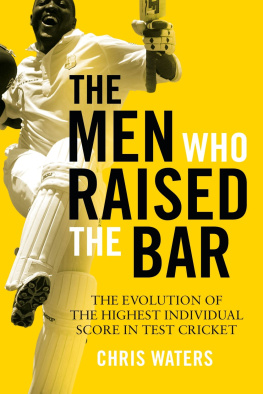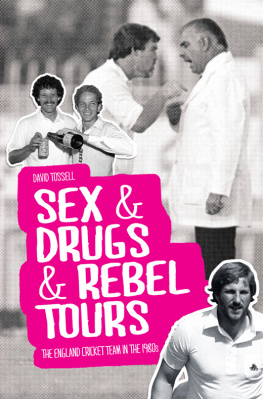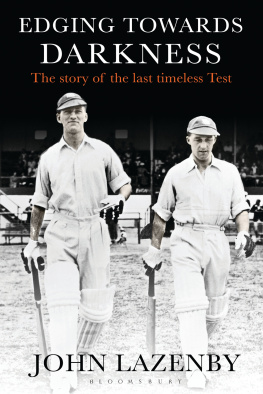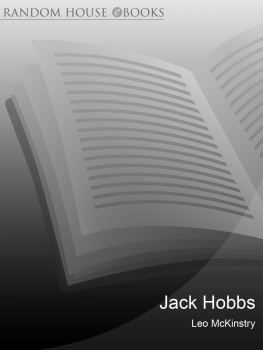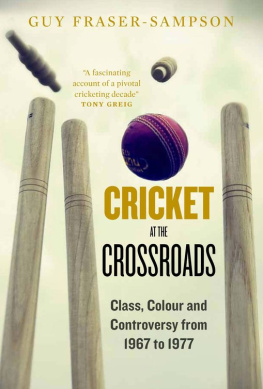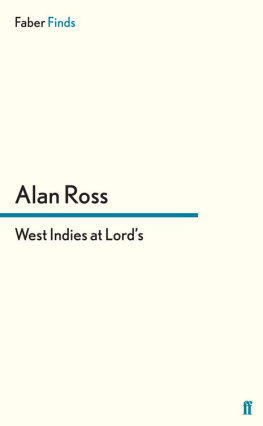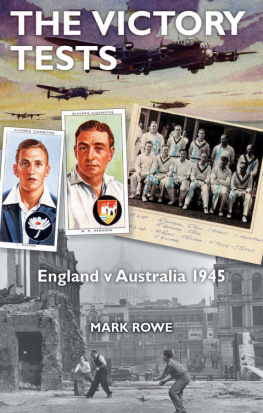First published by Pitch Publishing, 2017
Pitch Publishing
A2 Yeoman Gate
Yeoman Way
Durrington
BN13 3QZ
www.pitchpublishing.co.uk
Andrew Murtagh, 2017
All rights reserved under International and Pan-American Copyright Conventions. By payment of the required fees, you have been granted the non-exclusive, non-transferable right to access and read the text of this e-book on-screen. No part of this text may be reproduced, transmitted, downloaded, decompiled, reverse-engineered, or stored in or introduced into any information storage and retrieval system, in any form or by any means, whether electronic or mechanical, now known or hereinafter invented, without the express written permission of the Publisher.
A CIP catalogue record is available for this book from the British Library.
Print ISBN 978-1-78531-322-6
eBook ISBN 978-1-78531-345-5
--
Ebook Conversion by www.eBookPartnership.com
Contents
This book is for my brother,
Dominic, who really was
Colin Cowdrey in those
interminable cricket
matches in the back garden |
Don Bradman was a great batsman. Colin Cowdrey was a great man.
Sir Garry Sobers on why he had chosen to attend Cowdreys memorial service and not Bradmans.
Foreword
Tribute to the Life of the Lord Cowdrey of
Tonbridge, CBE
By the Rt Hon John Major, CH, MP
Westminster Abbey
Friday 30 March, 2001
T HERE is a moment, when someone dies, when raw emotion has a way of letting you know just how much they meant to you. When Michael Ancram phoned me with the news, I had a prickling in the eye that came unbidden and would not go away. No more Colin. Millions some of whom had never met him felt the same.
To those millions, Colin was one of the worlds greatest cricketers. To those of us who knew him, he was one of the worlds loveliest of men. That is why this Abbey could have been filled many times over.
Letters to the family came pouring in from all over the world:
From Australia:
When one thinks of Colin Cowdrey, one thinks of grace, elegance and England.
From India:
Sad to see you go, Mr Colin. We loved you in India.
From Sydney came a prophecy, which I hope is true:
Bowlers, beware! The great firm of Cowdrey and May are about to renew their partnership!
There were many more such affectionate letters from all those whose lives Colin had touched.
Its not that Colin was a great cricketer though that he was: the prodigious talent of the boy ripened, to make the man, the greatest pear-shaped batsman of our time. Although on a bad day he could have the cricketing equivalent of writers block, most of his batting was pure poetry.
At Melbourne, aged 21, he scored a hundred for England that old men still babble about. I heard some of that innings over the static in the middle of the night my ear pressed to the radio to avoid waking my parents who thought that a ten-year-old should be asleep. Lovely people, my parents but they never did understand cricket.
Colin was a special man too. In the early 1990s he came to see me at Number 10 with some South African officials. As we sat in my study, beneath a portrait of W.G. Grace, he asked me to speak to some Commonwealth heads of government to help South Africa back into the world game. I did. They were admitted: but it was Colins love of cricket that was the driving force.
He had a great affinity for the young. He helped me launch a sports initiative at a London stadium, following which we had an impromptu game of cricket with a veritable United Nations of children. An Indian boy bowled; I kept wicket; Colin batted and hit up a catch to a Jamaican girl. As she caught the ball, he cheered, Well played. Bravo! Well played an encouragement he used a thousand times a year. The girl skipped up and down, eyes shining and pigtails flying. Once again, Colin had used that extraordinary gift he had for making anyone in his company feel 100 feet tall. If I ever saw the joy of life, I saw it then. It was a very happy moment.
As Christopher has already said, Colin was a great writer of notes and a world-class user of the telephone. Whenever I faced political difficulty, Colin would be there. So we were in touch a lot.
The phone would ring and a voice would say, Morning, Skipper Cowdrey here. Or thered be a note many notes. They were always upbeat. Bravo! Well played. 100 not out, hed write even if I had been bowled out for nought.
Sometimes if life was more than usually turbulent, he would phone those closest to me at Number 10 and ask if he could pop in for a drink.
For Colin, the answer was always yes. And when I walked into my flat above Number 10, late at night, hed often be there tumbler of whisky in hand his gently smiling face and wise words bringing sanity and common sense to the frenetic world of politics. Colin never talked of this publicly nor did I, before now. But it illustrates the kind of man he was: a friend in bad times as well as good. Truly a man for all seasons.
Colins gift for letter-writing was no doubt hereditary. There is a letter written from Malabar, India, in October 1940, from Colins mother, Molly, which paints a wonderful portrait of a happy cricket-mad boy enjoying himself and loving cricket. And have you noticed his initials? Molly wrote. MCC. How proud she would have been of the extraordinary man her boy grew up to be.
But then family pride is a Cowdrey trait. Colin always spoke with such affection for Chris, Jeremy, Carol and Graham and his years with Penny. He was so proud of all their achievements whether on or off the cricket field with hundreds of stories which he would recount with an air of wonder that he and Penny should have produced such a talented crew.
And his joy over Anne and her horses bubbled over like uncorked champagne. He would phone me when a horse won. Shes done it! Done what? Won. Won what? The race ... Annes won. And after a while even the horse got some credit too.
Colin is a loss to us all, but the greatest loss is to his family.
A modest man, blessed with the gift of friendship. A gentle man with a God-given talent. Kipling was right, If you can walk with crowds and keep your virtue, or walk with Kings nor lose the common touch.
Colin never lost it.
In life, said a lesser poet than Kipling, it matters not who wins or loses, but how the game is played. And how well Colin played it.
Captain of Kent and England; president of Kent and MCC; a Commander of the British Empire; a Knight of the British Empire; a Peer of the Realm. A man of Kent who left his mark on so many lives and had friends and admirers in every corner of the world.
And when Colin died, the England team wore black armbands for him and beat Pakistan in the gathering gloom in Karachi. As the unlikely victory neared, Colins family and friends had returned from his funeral service and were gathered in his study at Angmering cheering them on. How he would have loved it. And how we missed him.
The day before he died, Colin was due to attend a meeting of the Masters Club, followed by lunch at The Oval to honour Jack Hobbs the man known universally in cricket as The Master. He couldnt make it and sent a note, It is with great regret that I cannot be at The Oval today to celebrate The Masters Birthday. He went on, What a magnificent season Surrey have had. Many, many congratulations.
This was a characteristically gracious ending to a note that may well have been the last he wrote before the Young Master went off to join the Old Master, at a far Higher Table than The Oval.

